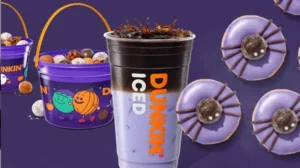The year is 2080. The playgrounds echo with the familiar shouts of “Liam!” and “Olivia!” Over and over. A city bus pulls to a stop and a dozen heads turn at once when a passenger calls out to “Noah.” In a quiet corner café in what used to be Denver but is now a floating high-altitude climate dome called “DenvR3,” a barista named Emma makes cortados for customers also named Emma. Outside, a digital billboard glows, commemorating the 100th anniversary of the Social Security Administration’s annual baby name rankings—a tradition that once seemed trivial, now inadvertently prophetic.
This isn’t speculative fiction. Not quite. But it’s a logical endpoint of trends that, year after year, become harder to ignore. For six years and counting, Liam and Olivia have been the top baby names in the United States, according to the SSA. And trailing closely behind them are Emma and Noah, rounding out a quartet that’s been locked in place like a linguistic Mount Rushmore of 21st-century Americana. The consistency is uncanny, bordering on obsessive. These aren’t just names. They’re signifiers of an era that refuses to evolve.
The Rise of Monoculture in Naming
Names, at their core, are acts of imagination. They represent both heritage and aspiration. They can evoke myth, geography, ideology, or even rebellion. Yet today’s dominant names have lost some of that imaginative power. Olivia doesn’t signal Shakespeare anymore. Liam doesn’t summon Gaelic pride. Emma and Noah no longer read as throwbacks to Victorian fiction or biblical gravity. They’ve been domesticated, stripped of eccentricity, and rendered algorithmic by mass preference.
Naming has become less about crafting individuality and more about reaffirming safety. In a society increasingly anxious about uncertainty—from climate change to AI to geopolitical instability—parents may be seeking stability in the one place they still control: the birth certificate. A child named Olivia will not raise eyebrows. A Liam will not be teased. These names are future-proof in the most generic way possible. They’re perfectly engineered to blend in.
Yet in trying so hard not to stand out, these names now stand out precisely for how unremarkable they’ve become. They are the beige of names. The same phenomenon can be seen in other aspects of American life: same Starbucks, same strip malls, same apartment complexes. When culture trends toward homogeneity, names follow suit.
Naming as Fashion: A Historical Rewind
The peculiar thing about naming is that it often mimics the fashion cycle, but with even more lag. Names fall in and out of vogue not over months, but decades. Just as high-waisted jeans or flared pants reappear every 30 years, so too do names. Yet even this cycle seems to have stalled.
In the 1940s, names like Gary, Jerry, and Larry were dominant. On the girls’ side, Mary reigned supreme—so much so that nearly a third of all girls born in 1947 were given the name. But Mary’s fall was steep: by 2024, she had slipped to 132nd in the rankings. Once omnipresent, Mary has been dethroned by the Olivias of the world, who now enjoy the same market saturation Mary once held.
And yet, today’s naming culture is strangely more stagnant. Back then, new names surged quickly—Jennifer in the 1970s, Ashley in the 1980s, Madison in the early 2000s. Now, the peaks are flatter and longer. It’s not that parents are choosing uniquely weird names instead—it’s that they’re not cycling out the old champions. Olivia has ruled for over half a decade. Emma held the crown for five years before that. Liam has enjoyed an uninterrupted reign since 2017.
This isn’t a wave; it’s a plateau.
The Influence of Media, Celebrity, and Data
Of course, name popularity doesn’t exist in a vacuum. Cultural forces—especially media and celebrity—often light the initial spark. Olivia surged in the early 2000s, helped along by characters in Law & Order: SVU (Olivia Benson) and Scandal (Olivia Pope). Liam owes some of its modern charm to actor Liam Neeson and the heartthrob aura of Liam Hemsworth. Emma Watson made Emma resonate for an entire generation of Harry Potter fans. Noah likely gained mass appeal following The Notebook’s Noah Calhoun, played by Ryan Gosling.
But pop culture no longer just suggests; it dominates. Where a name like Beyoncé or Zendaya once stood alone as a rarefied singularity, names like Olivia and Liam were never meant to be unusual. They were designed to circulate—mass appeal as a branding strategy.
Data, too, plays a new role. Parents now consult name-ranking websites, social media lists, even AI tools to predict what names will “age well” or “sound smart.” But by making names a product of predictive analytics, we’ve removed the personal. It’s the equivalent of naming your child with SEO in mind. We’ve begun to optimize names the way we optimize Instagram captions—pleasing to the crowd, but drained of eccentricity.
The Problem with Popularity
There’s nothing inherently wrong with popular names. But when names become too popular, they risk becoming de-individualized. In a class of twenty preschoolers, five Emmas and four Liams are not just a logistical nightmare for teachers — they are a psychological hint that our cultural appetite for uniqueness is faltering.
And yet, this seems to contrast sharply with the American myth of individualism. We champion freedom, rebellion, uniqueness. But we name our children in flocks. What gives?
The answer may lie in the growing contradiction between personal branding and private identity. In public, we want to be noticed—but in private life, many want to disappear into the middle. To name your child Olivia is to give them the armor of acceptability, the bland safety of being neither mocked nor mistaken. It is the name of someone who fits in and sails smoothly.
That’s not a criticism—it’s a revelation. The American Dream today is less about standing out and more about staying afloat.
What the Future Holds (Beyond Liam and Olivia)
Will this trend continue until 2080, when every office worker, artist, scientist, and criminal is named Liam, Olivia, Emma, or Noah? Probably not. Naming trends, even the most entrenched ones, always fade. What seems stable now could shift drastically with one cultural moment. A major celebrity scandal, a new war hero, or the next viral Netflix character could topple these reigning champs overnight.
More optimistically, the rise of multicultural naming conventions is already beginning to push back against the homogeneity. Names like Mateo, Aaliyah, Luna, Leilani, Santiago, and Gianna are gaining ground in the top 20s. This signals a country that is, despite its many battles over identity, slowly becoming more inclusive in how it sees and names itself.
Still, as the year 2080 approaches, it’s hard not to wonder what kind of society we’ve named into being. A society where everyone answers to the same few syllables. Where language loses its texture. Where names don’t surprise you anymore—they just confirm a pattern.
But maybe that’s the irony. Maybe the real rebellion in 2080 will be the return of names like Bertha, Gerald, or Mildred. Maybe someone will finally name their daughter Janet again—not as nostalgia, but as subversion. Maybe the real act of radical individuality in the future won’t be choosing something unique, but choosing something uncool.
Naming as Cultural Mirror
In the end, names are not just about the children who bear them. They’re about the parents who choose them—their hopes, fears, values, and the world they imagine for their offspring. When we look at the dominance of names like Liam and Olivia, we’re not just seeing a statistical curiosity. We’re seeing a cultural echo.
The names we give are a map of our collective imagination. And right now, that map looks flat and safe. But the terrain can always change.
So here’s to the next generation—not just of Liams and Olivias, but of weird, wild, unwieldy names. Here’s to the kids who will one day ask, “Why does everyone in this family have the same name?” and get an answer rooted not in fear or conformity, but in the chaotic beauty of cultural evolution.
Because naming, like life, should be messy, personal, and gloriously unpredictable.
No comments yet.








